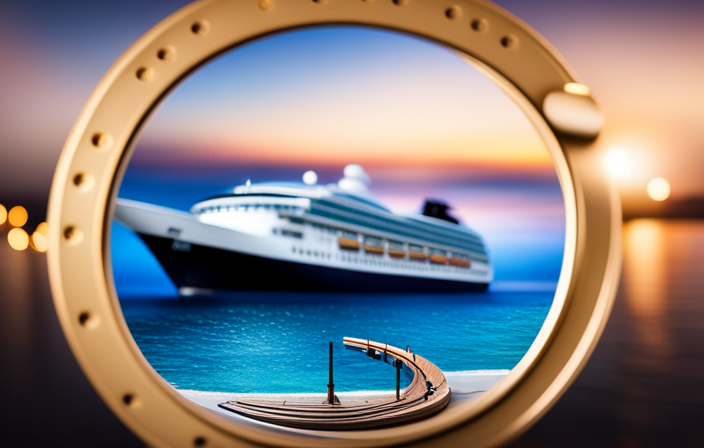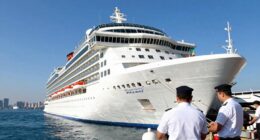Going on a cruise while pregnant is definitely an exciting adventure! There are many factors to take into account, from the various policies of different cruise lines to health tips and recommendations for a comfortable journey. It’s more than just boarding a ship and cruising off into the sunset.
Each cruise line has its own restrictions and requirements for pregnant passengers, so it’s important to do your research beforehand. And don’t forget about the availability of healthcare options at different ports of call, because you never know when you might need a little extra TLC.
Oh, and motion sickness? Yeah, that can be a real buzzkill, especially when you’re expecting. But fear not, there are ways to prevent it and make your time on the ship more enjoyable.
And let’s not forget about the excursions and activities – you’ll want to make sure they’re safe for you and baby.
So, buckle up (or should I say, belly up?) and get ready for a cruise like no other!
Key Takeaways
- Major cruise lines have policies that prohibit pregnant women from sailing after 24 weeks of gestation.
- Different cruise lines have varying requirements for pregnant passengers, including the need for a physician’s letter or medical certificate.
- Pregnant passengers should consider health care options in different cruise destinations and consult with a medical professional before planning their itinerary.
- Pregnant passengers should also consider factors such as nausea and motion sickness, as well as the suitability of activities and shore excursions during pregnancy.
Policies on Pregnant Passengers
I found out that cruise lines have varying policies regarding pregnant passengers. Some prohibit them from sailing after 24 weeks and require additional documentation like a physician’s letter or a medical certificate.
Each cruise line has its own specific requirements and guidelines for pregnant passengers. For example, Princess Cruise Line requires a physician’s letter stating good health and low-risk pregnancy, while Norwegian Cruise Line asks for pregnancy details and a medical certificate. Royal Caribbean and Celebrity prohibit passengers over 23 weeks pregnant and require a health questionnaire. Disney Cruise Line does not allow passengers at 24 weeks of gestation, even with a doctor’s note.
It’s important for pregnant passengers to be aware of these policies and to consult with their healthcare provider before planning a cruise. Additionally, there are potential risks for pregnant passengers to consider, such as the increased likelihood of motion sickness and the need to be mindful of healthcare options in different cruise destinations.
Health Care Options
Health care options for pregnant passengers should be researched and discussed with a medical professional before planning a cruise itinerary. It’s important to ensure that appropriate medical care will be available in case of any complications during the trip.
Additionally, pregnant passengers should consider obtaining travel insurance that covers pregnancy-related complications, as coverage may vary by provider.
When it comes to health considerations, pregnant women should be aware of the risks associated with mosquito-borne viruses such as Zika, dengue, and malaria. It’s recommended to check CDC alerts for affected countries and take necessary precautions to prevent mosquito bites, such as using bug repellent, wearing long sleeves and pants, and staying in air-conditioned or screened-in areas.
By taking these steps and consulting with a healthcare professional, pregnant passengers can make informed decisions about their cruise travel and ensure their health and safety throughout the trip.
Preventing Motion Sickness
To prevent motion sickness on a cruise, pack peppermint gum or lozenges to soothe the stomach and senses. Peppermint has been used for centuries to calm digestive discomfort and reduce nausea.
Other natural remedies include ginger, which can be taken as capsules, tea, or ginger candies. Ginger has anti-inflammatory properties that can help alleviate motion sickness symptoms.
Additionally, acupressure wristbands can provide relief by applying pressure to specific points on the wrist.
If natural remedies are not effective, over-the-counter medications for motion sickness, such as dimenhydrinate or meclizine, can be considered. These medications work by blocking signals to the brain that trigger nausea and vomiting.
It’s important to consult with a healthcare professional before taking any medication, especially during pregnancy.
Considerations for Excursions
When planning excursions on a cruise, it’s important to review the activity level and duration to ensure they’re suitable for your current condition. As a pregnant woman, it’s crucial to prioritize your safety and well-being. Look for excursions that involve gentle activities, such as sightseeing tours or cultural experiences, rather than strenuous physical activities like hiking or water sports.
Additionally, consider the climate and weather conditions of the destinations you’ll be visiting. Mosquito-borne viruses, such as Zika, dengue, and malaria, can pose a risk to pregnant women. Prevent mosquito bites by using bug repellent, wearing long sleeves and pants, and avoiding outdoor activities during peak mosquito activity times.
Prioritizing your health and taking necessary precautions will help ensure a safe and enjoyable excursion experience during your cruise while pregnant.
General Travel Tips
I always make sure to check the American state department’s travel advisories before going on a cruise to stay informed about the safety and health conditions in each country. It’s important to be aware of any travel alerts or warnings that may affect pregnant passengers.
In addition to checking travel advisories, there are a couple of other important considerations for pregnant women planning to cruise.
-
Travel insurance coverage: It’s highly recommended for pregnant women to have travel insurance that includes coverage for pregnancy complications. The specific coverage may vary by provider, so it’s important to review the policy details and ensure that it meets your needs.
-
Passport considerations: Having a valid passport is essential for international travel, including cruises. It’s advisable to have a passport even if you’re cruising within your own country. In case of any delays, missed ships, or unexpected circumstances, having a passport can provide peace of mind and facilitate travel arrangements.
Remember to consult with your healthcare provider before making any travel plans, especially during pregnancy. They can provide personalized advice based on your individual health status and gestational age.
Frequently Asked Questions
Are there any restrictions on dining options for pregnant passengers on a cruise ship?
Dining options for pregnant passengers on a cruise ship may vary. Many cruise lines offer pregnancy-friendly menu options, including a variety of healthy and nutritious meals. It is advisable to consult with the cruise line for specific details.
Can pregnant passengers participate in onboard activities and entertainment?
Pregnant passengers may have limitations on participating in onboard activities and entertainment due to safety considerations. It is important to follow cruise line policies and consult with a healthcare professional for guidance.
What are the common concerns or risks associated with cruising while pregnant?
The common concerns and risks associated with cruising while pregnant include potential complications, limited access to healthcare, increased susceptibility to motion sickness, and the risk of contracting mosquito-borne illnesses. It is important to consult with a healthcare professional before making any decisions.
Are there any restrictions on using the onboard spa or fitness facilities for pregnant passengers?
Pregnant passengers may encounter restrictions when using the onboard spa and fitness facilities. These restrictions aim to prioritize the safety and well-being of the mother and baby. It is advisable to consult with the cruise line for specific guidelines.
Are there any specific guidelines or restrictions for pregnant passengers when it comes to embarkation and disembarkation procedures?
Embarkation and disembarkation procedures for pregnant passengers prioritize safety. Passengers may need to provide medical documentation and complete health questionnaires. Boarding and exiting the ship may require additional assistance to ensure the well-being of pregnant individuals.










